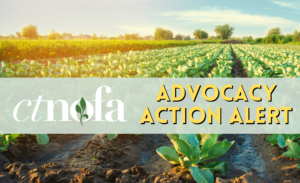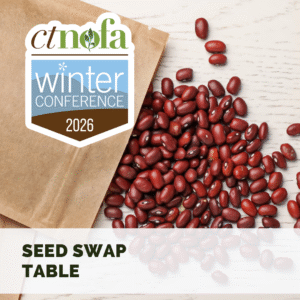Advocacy End-of-Session Update

June 30, 2023
Advocacy Report for the End of the 2023 CT Legislative Session
From Dr. Kimberly Stoner, CT NOFA Director of Advocacy
My role as a part-time Director of Advocacy for CT NOFA is not just to advocate on behalf of our members. It is also to encourage you to become more involved in advocating for organic agriculture and land care, a clean and healthy environment, and taking action on environmental justice and climate change.
What I have learned about how you can become an advocate:
- The Connecticut legislature is not as polarized on environmental issues as Congress. Of the bills that passed in committee or in at least one chamber, many had both Republican and Democratic votes. Don’t assume your legislator’s position based on political party.
- What legislators say, over and over, is that they do pay attention to what they hear from people in their own districts. Make sure your own legislators know who you are and what issues you care about. You can do that now to build a relationship before the next session, and then follow up during the session next year.
- Organize your neighbors. The more people they hear from in their district, the better.
- Call your legislators to account. Be respectful and polite, but also firm and clear about what you are asking the legislator to do. And, if you get a chance, do it in a public forum so that they have to go on the record.
- When they do what you ask, thank them! That helps to continue building a relationship so that they know who you are and what concerns you have.
Here’s my report on wins and losses for the environment in the last session:
Cause to celebrate
- After years of effort by Rep. Geraldo Reyes, Alex Rodriguez of Save the Sound, and collaboration from a vast array of organizations (including CT NOFA) and individuals, the legislature passed SB 1147, a bill strengthening our Environmental Justice Law. This bill would provide the CT Department of Energy and Environmental Protection and the CT Siting Council with the ability to deny permits for new polluting facilities in already overburdened environmental justice communities. This is an important step forward. You can read more about the bill here.
Some other environmental bills that passed
- SB 100 — establishing an an account to provide grants to towns for testing and remediating drinking water supplies for PFAS. (PFAS stands for Poly Fluorinated or Per-Flurorinated Alkyl Substances. These chemicals are widely used in consumer products and are now widespread in the environment and have serious effects on human health. You can read more about them here.)
- HB 5608 — requiring a bond for any solar facility built on prime farmland to pay for decommissioning the facility, restoring the soil, and paying for a soil scientist to certify that the soil has been adequately restored.
- For Long Island Sound, bills supporting a working group for the restoration of eel grass, and protection of horseshoe crabs from harvesting.
Disappointments
- Somehow, even in a week when the air was full of smoke from climate-related wildfires in Canada, and when the Commissioner of Agriculture declared an agricultural disaster based on extreme weather related to climate change for the third year in a row, the leadership in the CT legislature still does not consider climate a high enough priority to bring major climate bills to a vote. CT NOFA will continue working with the CT Coalition on Climate Action to demand that the state put into action our goals for greenhouse gas reduction and climate adaptation.
- Although the bill banning neonicotinoid insecticides was carefully crafted to apply only to cosmetic uses like lawns and golf courses, and the bill passed the Environment Committee, it did not go to a vote in either the Senate or the House.
- The CT Environmental Rights Amendment, an amendment to the state constitution that would guarantee the equitable protection of the rights of all to clean and healthy air, water, and soil, a stable climate, and healthy ecosystems, did not get a vote in the Environment Committee, so never had a chance to move forward.
Recent Posts
Support Staff for the Farmland Access Grant Program
On February 20, the Connecticut Appropriations Committee will hold their public hearing on Department of Agriculture funding appropriations. In the previous legislative session, they passed the Farmland Access Grant Program, which aims to help farmers overcome barriers to accessing land and create viable pathways for farm succession. However, there is currently no funding for staff to administer this program, which would effectively render the program non-operational. We urge concerned constituents to contact their state legislators – especially those who legislators also sit on the Appropriations Committee – and ask them to provide funding for these critical staff positions.
Read More2026 Seed Swap at CT NOFA Winter Conference
The Seed Swap Table is where conference attendees can exchange seeds and diversify their gardens and farms with unique and regionally adapted varieties. The swap is open to all conference participants, from home gardeners to experienced growers. Participants are invited to bring labeled seeds to share and take home new seeds to try. The swap operates on a trust-based, give-and-take system — bring what you can and take what sparks your interest.
Read More

